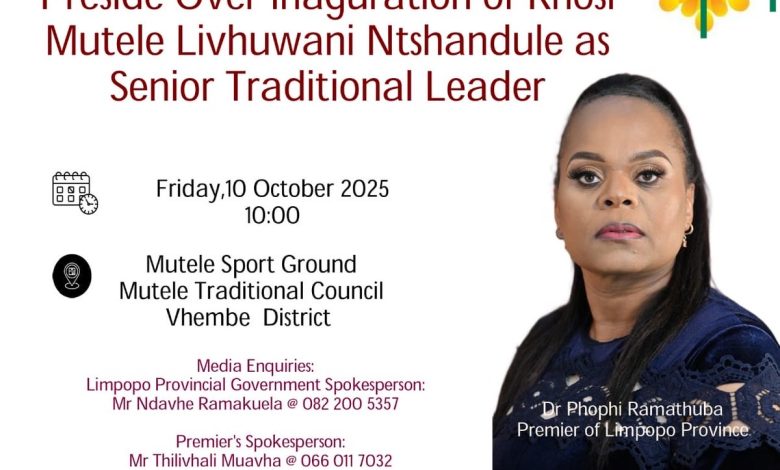New chapter dawns as youngest female Thovhele graduates

Premier Dr. Phophi Ramathuba recently highlighted a truly pivotal moment for Limpopo Province, sharing her profound observations on the evolving landscape of traditional leadership. She expressed her enthusiasm for what she described as transformative and historic changes, signifying the dawn of a new era where traditional customs are progressing without losing their fundamental essence. A key example of this positive shift is the recognition of a young, graduate female Thovhele, demonstrating a clear move away from patriarchal norms towards a future where wisdom and leadership are no longer confined by gender. This development underscores the province’s commitment to embracing inclusive leadership and modern values while honouring heritage.
Detailed points
- Observation and statement: Premier Dr. Phophi Ramathuba shared her insights on transformative and historic moments in traditional leadership.
- Core message: A new chapter is unfolding where patriarchal customs are giving way to more progressive approaches.
- Key change: Wisdom and leadership are no longer solely measured by gender.
- Specific example: The Premier highlighted the emergence of a young, graduate female Thovhele as a symbol of this evolution.
- Overall goal: Traditional leadership is adapting and evolving while still maintaining its fundamental soul and cultural integrity.
- Context: These developments are taking place within Limpopo Province, aligning with the provincial government’s vision for inclusive governance and community development.
Premier’s office reflects on modernising traditional leadership
In Limpopo Province, we are constantly working towards a future that blends our rich cultural heritage with the progress of modern society. Premier Dr. Phophi Ramathuba has consistently championed initiatives that foster development and equality across all sectors, and this commitment extends to our esteemed traditional leadership. The Premier’s recent remarks underscore a truly significant trend within our communities: the embrace of progressive customs that challenge long-standing patriarchal structures.
It is with immense pride that we observe these transformative shifts. The Premier often speaks about the importance of youth empowerment and gender equality, and these principles are now visibly taking root within our traditional institutions. The recognition of a young, educated female Thovhele is a powerful testament to this evolution. It shows that leadership is increasingly being valued for intellect, capability, and vision, rather than simply by gender or inherited male lineage. This particular example highlights how education and modern understanding can strengthen traditional roles, ensuring that our leaders are well-equipped to guide their communities through contemporary challenges and opportunities.
The provincial government, under Premier Ramathuba’s guidance, believes that for our province to truly thrive, all voices must be heard and all talents utilised. Engaging with traditional authorities and supporting their organic evolution is a cornerstone of this approach. We believe that by nurturing leaders who are both deeply rooted in culture and forward-thinking, Limpopo can build resilient, inclusive communities that honour their past while confidently stepping into the future. For more information on how our provincial government supports various initiatives, please visit the official Limpopo Provincial Government website.
Questions and answers for the public
-
What is the main message from Premier Dr. Phophi Ramathuba‘s recent statement?
The Premier is highlighting the positive and transformative evolution of traditional leadership in Limpopo Province, particularly the shift away from old patriarchal norms and the rise of capable female leaders.
-
What kind of ‘new chapter’ is being observed in traditional leadership?
It’s a chapter where progressive customs are replacing patriarchy, and wisdom is no longer exclusively linked to gender, allowing traditional leadership to evolve without losing its core identity.
-
Why is the mention of a ‘graduate female Thovhele’ significant?
This is significant because it represents a concrete example of a young, educated woman taking on a traditional leadership role, challenging gender barriers and showcasing how modern education can enhance traditional authority.
-
How does the Premier view the changes happening within traditional institutions?
She views them as “transformative and historic moments,” indicating a strong endorsement and appreciation for these progressive developments.
-
Does the provincial government support the modernisation of traditional leadership?
Yes, the Premier’s office actively supports initiatives that encourage traditional institutions to adapt and evolve, embracing modern values like gender equality and youth empowerment while respecting cultural heritage.
-
How can traditional leadership contribute to the broader development of Limpopo Province?
By evolving to be more inclusive and forward-thinking, traditional leaders can play a crucial role in fostering community resilience, promoting education, and ensuring that local development initiatives are culturally sensitive and widely supported.
-
Are there programmes in place to encourage young people, especially women, to take on leadership roles?
The provincial government, through various departments, encourages youth participation and leadership development across all sectors, including traditional institutions, to ensure a diverse and capable pool of future leaders.
-
Where can I find more updates from the Premier’s office regarding these and other provincial activities?
For further updates and insights into the Premier’s activities and other provincial news, you can always check out more Premier’s Office News.





